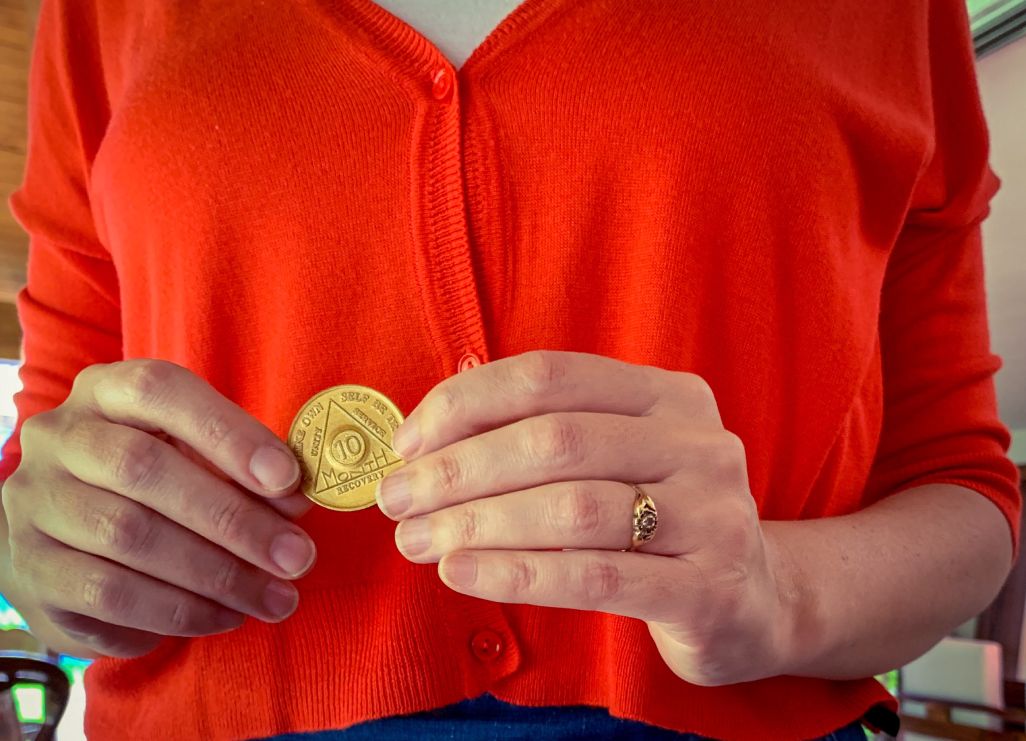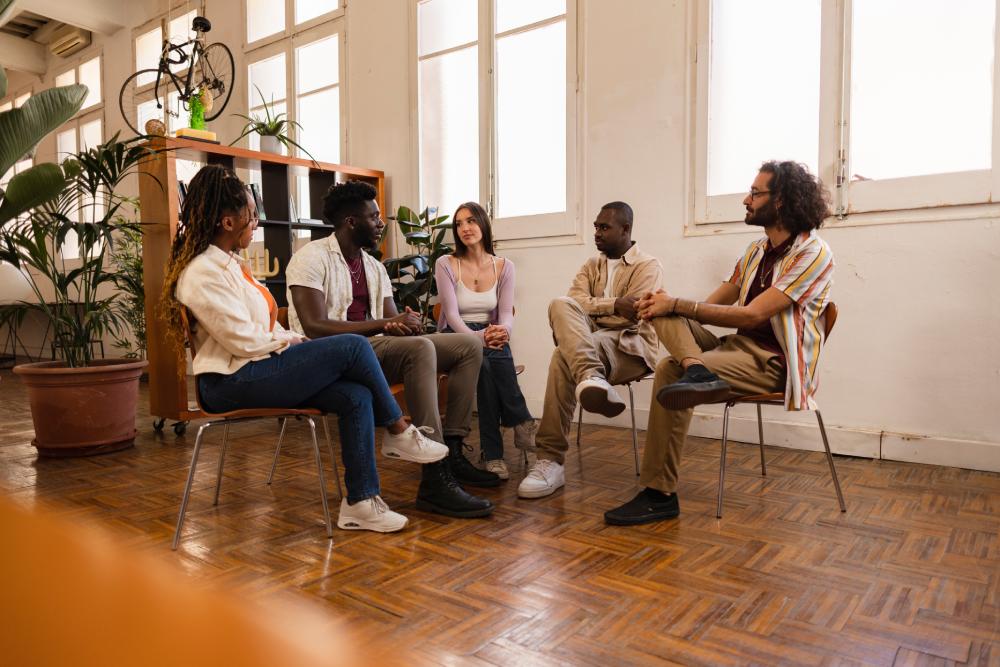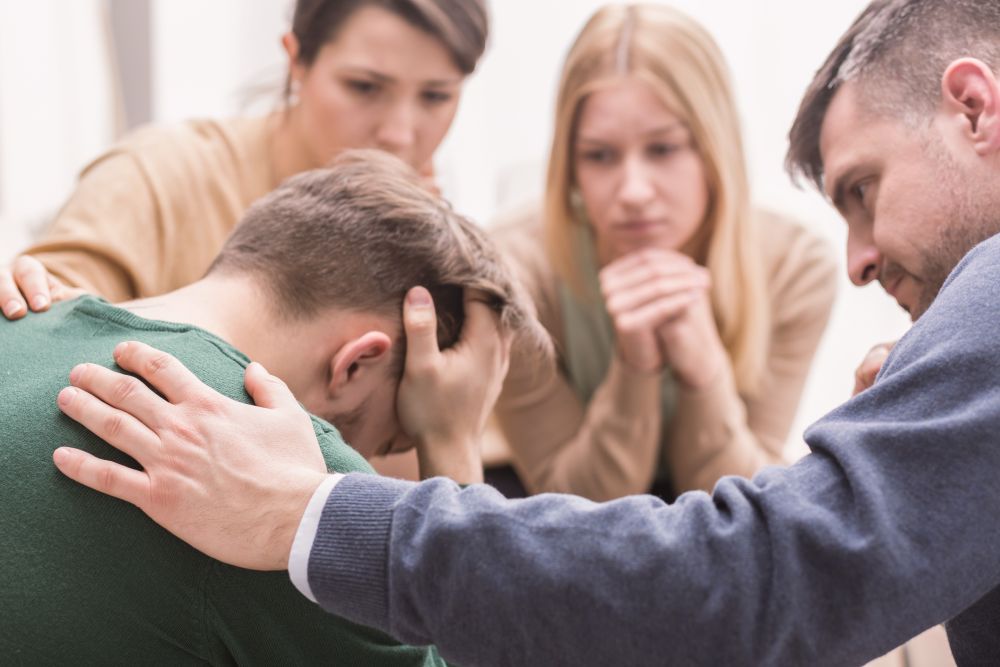Table of Contents
TL;DR:
- Peer support is provided by individuals with lived experience of addiction and recovery and can help with professional treatment.
- Benefits include emotional and practical support, lower relapse rates, and increased treatment adherence.
- Peer support comes in various forms: 12-step programs, online communities, and mentorship.
- Overcoming stigma, raising awareness, and addressing financial barriers are crucial for expanding access.
Addiction can feel like an endless cycle of cravings, consequences, and a sense of being stuck. It’s tough, not just for the person struggling but for their loved ones, too.
While professional treatment is key, recovery is about more than just therapy or medication. It’s about connection, understanding, and learning from those who’ve been there. That’s where peer support makes a real difference. It offers community, hope, and practical advice from people who truly get it.
Let’s explore why peer support matters in addiction recovery, how it works, and how it can complement professional treatment for long-term healing.
What is Peer Support in Recovery?
Peer support in recovery is all about people who’ve been through addiction and recovery helping others on the same path. It’s based on shared experiences, creating a connection that can be hard to find elsewhere.
Unlike professional therapy, which is led by clinicians, peer support is often guided by a peer recovery support specialist. They’re not therapists or clinicians but mentors who’ve been through it and now offer empathy, hope, and real-world guidance.
It’s important to note that peer support isn’t meant to replace professional treatment—it’s there to complement it. It works alongside therapy, medication-assisted treatment, and other clinical care, adding an extra layer of support.
The Benefits of Peer Recovery Support
Peer support makes a big difference by addressing the many challenges of addiction. Here are some key benefits:
Emotional Support
Addiction can feel isolating, bringing shame, guilt, and stigma. Connecting with someone who’s been there can make a huge difference. Peer support offers a sense of belonging and a judgment-free space to share experiences. This connection is key to healing and building resilience.
Practical Support
Recovery comes with real-life challenges, and recovery peer support specialists can help with essentials like housing, jobs, and transportation. They can also offer guidance on life skills like budgeting, time management, and handling triggers. This support helps individuals rebuild their lives and create a strong foundation for lasting recovery.
Lower Relapse Rates
Studies show that peer recovery support helps reduce relapse. With ongoing encouragement, guidance, and real-life advice, peer support specialists help individuals handle triggers, manage cravings, and build healthy coping skills. This makes it easier to stay on track.
Sticking with Treatment
Staying engaged in treatment isn’t always easy, and many people struggle to keep up. Peer support helps by offering encouragement, practical help, and a real understanding of the process. A peer recovery support specialist can guide individuals through challenges and keep them motivated to stay committed to their recovery plan.
Building Confidence and Purpose
Peer support is all about empowerment. By sharing their experiences and helping others, individuals in recovery find a sense of purpose and reinforce their own commitment to healing. It’s a reminder that recovery isn’t just possible—it can turn someone into a source of strength and change for themselves and others.
Types of Peer Support Programs and Services
Peer support comes in many forms, giving individuals options that fit their needs and preferences. From structured programs to informal support groups, there are plenty of ways to connect. Here are some common types:
12-Step Programs and Other Mutual Aid Groups
Peer-led groups like Alcoholics Anonymous (AA) and Narcotics Anonymous (NA) provide a structured approach to recovery through shared experiences and guiding principles. They offer a safe, supportive space to connect, share stories, and focus on personal growth.
Since these groups are widely available and free, they’re a valuable resource for many on the recovery journey.
Online Communities
The internet has made it easier than ever to connect with others in recovery. Online forums, social media groups, and virtual meetings provide a space to share experiences, ask questions, and get support from people who understand.
These communities are especially helpful for those in remote areas or who don’t have easy access to in-person groups.
Mentorship Programs
These programs connect people in early recovery with experienced peer recovery specialists who offer guidance, support, and encouragement. Mentors help navigate challenges, develop coping skills, and build a solid foundation for long-term sobriety. This one-on-one support is personalized, making it a valuable resource for those who need extra guidance.
The most effective type of peer support in recovery is the one that feels right for each person. Trying different options and finding the best fit is an important part of the recovery journey.
Overcoming Barriers to Accessing Peer Support
Some barriers may make peer support hard to access. Breaking down these obstacles is key to making sure everyone who needs support can get it.
Stigma
Fear of judgment and discrimination keeps many from seeking help. It can make opening up and connecting with peer recovery support difficult. Breaking the stigma through education and awareness helps create a more welcoming environment for recovery.
Lack of Awareness
Many people don’t realize peer recovery support programs exist. Spreading the word through outreach, community events, and online resources helps connect people to the support they need.
Educating healthcare providers and professionals about its benefits is also key.
Financial Barriers
While many peer support services are free, certified specialists can sometimes be harder to access due to cost.
Expanding insurance coverage and funding for community programs can help make these services more available to everyone.
Find Your Path to Recovery
By learning about the different types of peer recovery support and breaking down barriers to access, more people can benefit from this invaluable resource. Recovery is possible, and having peer support makes the journey feel less overwhelming and more hopeful.
If you or someone you love is struggling with addiction, you’re not alone. At Infinite Recovery, we know that true healing requires comprehensive care, including peer support in recovery. Our programs are designed to guide individuals toward lasting sobriety.
Reach out today to learn how we can help.

















